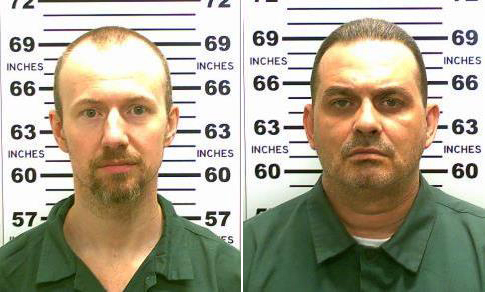
Albany, NY – An investigation into the escape of two murderers from an upstate prison last year concluded Monday that chronic staff complacency, complicit employees and failures of basic security procedures were to blame.
State Inspector General Catherine Leahy Scott’s report about the breakout of David Sweat and Richard Matt said security lapses at the maximum-security Clinton Correctional Facility at Dannemora, 25 miles south of the Canadian border, were longstanding.
“The extent of complacency and failure to adhere to the most basic security standards uncovered by my investigation was egregious and inexcusable,” Scott said.
Correction authorities have implemented changes, and many Clinton employees have resigned or been fired, she said.
The lapses include failures to search entering employees’ bags, negligent night counts of inmates, inadequate cell searches and poor supervision of inmates and civilian employees by security staff, she said.
Prison official didn’t immediately comment Monday on the inspector general’s report.
Matt, who had been serving 25 years to life for the killing of his former boss, and Sweat, who had been serving life without parole in the killing of a sheriff’s deputy, cut holes in the backs of their cells during recreation periods with saws and other tools smuggled in by a civilian employee of the tailor shop where they worked. They cut their way through their cell walls, climbed down catwalks and through tunnels, cut into and out of a large steam pipe and then exited through a manhole. They left behind a taunting note containing a crude caricature of an Asian face and the words “Have a nice day.”
The tailor shop employee, Joyce Mitchell, who’s now in state prison for providing the escape tools, had improper sexual relationships with each man, the report said. She talked about leaving with them and killing her husband, also a prison instructor, it said. Her husband was unharmed.
Over the course of about 85 nights, Sweat climbed down catwalks into the tunnels under the prison, explored for possible escape routes and cut through large steam pipes and the chain on the manhole cover where they got out. More than 400 inmate bed checks should have occurred in that period, and any one properly conducted would have detected Sweat’s absence, according to the report.
Guard Gene Palmer, who took the men pliers and a screwdriver and frozen meat in which Mitchell hid saw blades, was convicted of promoting prison contraband and was sentenced to six months in jail.
Mitchell also smuggled a road atlas to Matt and placed telephone calls inquiring about rental cabins in Vermont, which Matt had suggested as a potential place to go after the escape. The cabins were too expensive, however, and Matt said they would head to Mexico, where he said he had ties to a drug cartel. The two inmates even chose aliases: Sweat picked James Tuttle, and Matt opted for Tony Goya.
A three-week manhunt followed the escape, with up to 1,300 state, federal and local law enforcement personnel that cost the state $22.8 million in overtime.
Matt was shot dead by searchers June 26 in a wooded area 30 miles west of the prison. Sweat was shot and captured two days later near the Canadian border. Sweat pleaded guilty to escape charges and was ordered to pay restitution for some of the $573,000 in repair costs.
Mitchell, the tailor shop employee, pleaded guilty to charges related to providing hacksaw blades and other tools to the inmates. Palmer, the guard, pleaded guilty to a felony count of promoting prison contraband for taking in needle-nose pliers and a screwdriver and a misdemeanor official misconduct count.
The report has turned up numerous examples of what it called “failures in fundamental security operations,” including:
— Failure to search bags brought into the prison by employees, which enabled prison employee Joyce Mitchell to smuggle several items including an atlas, hacksaw blades and chisels into the prison.
— Improper prisoner counts at night that allowed David Sweat to make “near-nightly” trips from his cell as he worked on the escape route, and then allowed Richard Matt and Sweat to escape. State corrections policy mandates four “master” prisoner counts each day, along with hourly counts throughout the day and night. But Clinton guards performed only two “master” counts per day, and inmates told investigators guards often skipped counts entirely at night. Authorities also discovered guards often recorded prisoner counts before they were even conducted.
— Poor cell searches. Investigators found guards fell far short of requirements regarding cell searches, and that in the 12 months before the escape, 32 cells in the unit housing Matt and Sweat were not searched at all — including Sweats’. Guards said they did search Matt’s cell, in March 2015, but failed to discover the hole he had cut in the wall. Sweat later questioned whether guards actually searched Matt’s cell. The report also faults prison officers for failing to adequately inspect tunnels beneath the prison.
— Problems at the prison tailor shop that allowed Mitchell to engage in inappropriate conduct with Matt and Sweat. Mitchell’s supervisors first noticed her acting inappropriately with inmates but failed to take action. Inmates were allowed to join Mitchell in a private room within the shop without the presence of the guard.
— A lapse in oversight by the Department of Corrections and Community Supervision and prison management that allowed problems at the prison to continue.
As reported by Vos Iz Neias
